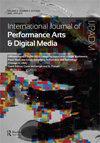Somatic Sauce 2020——诠释爱的治疗和庆祝
IF 0.9
0 THEATER
International Journal of Performance Arts and Digital Media
Pub Date : 2021-01-02
DOI:10.1080/14794713.2021.1880724
引用次数: 0
摘要
摘要舞蹈教育家Amelia Uzategui Bonilla利用Motion Bank基于网络的注释和出版工具,在科罗纳时代与国际同事进行远程合作。他们在当地舞蹈语言中有着共同的实践,在这种情况下,这些语言受到了来自拉丁美洲的非洲和土著人的影响。本文件详细介绍了一种非殖民化舞蹈记录方法,包括录制课程和对哥伦比亚波哥大的Alberto Barrios和加利福尼亚州奥克兰的Carmen Román的采访。罗曼跳费斯特霍舞,这是一种由秘鲁的非洲后裔培育的舞蹈。巴里奥斯舞Champeta是20世纪80年代在卡塔赫纳发展起来的一种舞蹈流派。他们的分析和讨论深入了解了这些复杂的运动形式及其所包含的知识。一个补充网页包括他们在线课程的注释视频和基于这些内容的对话。特定实践的言语化识别了一个由与社会、政治和自然环境相关的意象构建的词汇。本文件及其相应网站中的视听和书面材料相结合,展示了他们教授植根于黑人和土著文化的舞蹈的方法。它还谈到了记录新冠肺炎隔离期间舞蹈合作的潜力。本文章由计算机程序翻译,如有差异,请以英文原文为准。
Somatic Sauce 2020 – annotating Love Therapy and celebration
ABSTRACT Using Motion Bank’s web-based annotation and publication tools, dance educator Amelia Uzategui Bonilla engages in remote collaboration with international colleagues in times of Corona. They share a praxis in vernacular dance languages, in this case those with African and Indigenous influences from Latin American. This document details a decolonial dance documentation approach featuring recorded classes and interviews with Alberto Barrios, based in Bogota, Colombia and Carmen Román from Oakland, California. Román dances Festejo, a dance cultivated by Peru’s African descendants. Barrios dances Champeta, a genre developed in the 1980s in Cartagena. Their analysis and discussion gain insights on these complex movement forms and the knowledges they contain. A supplementary webpage includes annotated videos of their online classes and conversations on the basis of these. Practice-specific verbalization identifies a lexicon constructed from imagery related to social, political and natural environments. The combination of audiovisual and written material in this document and its corresponding website demonstrates their approach to teaching dances rooted in Black and Indigenous cultures. It also speaks to the potential of documenting dance collaborations during the COVID-19 Quarantine.
求助全文
通过发布文献求助,成功后即可免费获取论文全文。
去求助
来源期刊

International Journal of Performance Arts and Digital Media
Arts and Humanities-Visual Arts and Performing Arts
CiteScore
1.70
自引率
0.00%
发文量
29
 求助内容:
求助内容: 应助结果提醒方式:
应助结果提醒方式:


